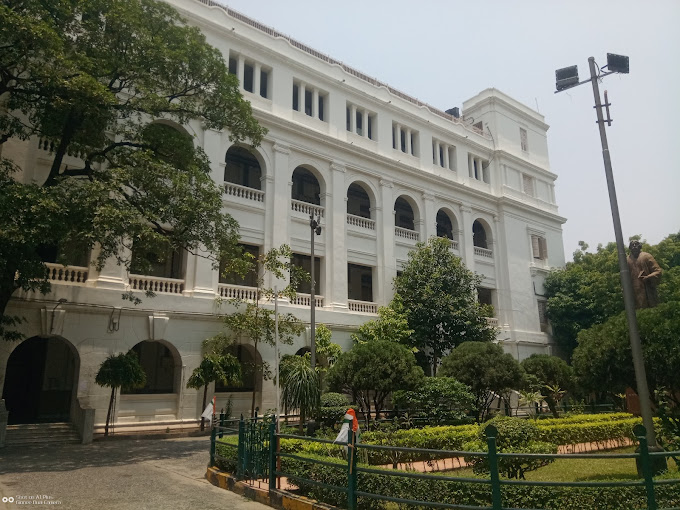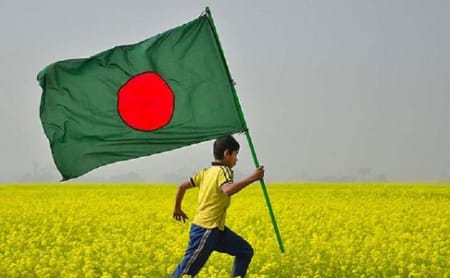Bimal Pramanik (Part II)

Calcutta University, Darbhanga Building
On 21 May 1971 a meeting of refugee teachers of all levels was convened in the Asutosh Hall of the Calcutta University and the Working Committee of the Bangladesh Shikshak Samiti (Bangladesh Teachers Association) was formed with the following personnel.
President Dr Azizur Rahaman Mallick, Vice-Chancellor, Chittagong
University.
Working President Janab Kamruzzaman, M.N.A., Headmaster, Dhaka Jubilee
High School.
Vice-President Dr Faruk Khalil, Professor of Mathematics, Rajshahi University
and Principal Dewan Ahmed, Kumarkhali College, Kustia.
Secretary Dr Anisuzzaman, Reader, Bengali Department, Chittagong
University. Later on Professor Ajay Ray, Reader, Department of Physics, Dhaka University became Secretary.
Assistant Secretaries (1) Janab Golam Murshid, representative of Universities.
(2) Sri Rashbehari Ghose, representative of Colleges.
(3) Janab S.M. Anwaruzzaman, representative of Schools.
Treasurer Dr Khan Sarwar Murshed, Professor, Department of English, Dhaka University.
Members There were 12 other members.
The objects of the Samiti was (1) to organize the teachers at all levels and consolidate them as an additional force in support of the liberation struggle. (2) to mobilize public opinion in India and abroad in favour of the liberation struggle. (3) to publish and to render help to other publishers in publishing authentic writings on liberation struggle of Bangladesh. (4) to rehabilitate and to render possible financial help to the teachers of Bangladesh. (5) to render financial help to ensure necessary civil supplies and send them to the fronts. (6) Publicity and help to psychological warfare.
This Samiti functioned from the office of the `Bangladesh Sahayak Samiti’ located at Darbhanga Building of the Calcutta University and carried a lot of responsibilities with the help of the Sahayak Samiti.
An appeal issued by the `Bangladesh Sikshak Samiti’ asking for help is reproduced below:
BANGLADESH SIKSHAK SAMITI
(Bangladesh Teachers’ Association)
Darbhanga Building, Calcutta University,
Calcutta-12, India.
July 1, 1971
Dear Friend,
Perhaps you are aware that in the face of unparalleled atrocities committed by the Pakistan Army on the people of East Pakistan, now Bangladesh, a large number of teachers of all levels have crossed into India. Since the communities of teachers had played a significant role for over two decades in the movement for democracy, secularism and a just social order in the country, its members became naturally enough a special target of the Pakistan Army. Many teachers have been killed, others who are trapped in the occupied zones are being harassed and persecuted, a few have been forced at gun point to issue statements in support of the action of the Pakistan Army. As a result, members of this harassed community are trekking into India everyday. The teachers from Bangladesh, now in temporary exile in India, have formed an association of their own, on whose behalf we are writing you today.
About 100 University teachers, 1000 College teachers, and 3000 school teachers have registered their names with us. Several thousand others in different bordering states of India are yet to make contact with the Association. Most of these teachers have come with their families and all are without any means to support themselves.
Having regard to the contribution that this community has made in the past and their expectant role in the reconstruction of society as and when the country achieves freedom, it is felt that we make all efforts to save it from impending doom. We have drawn up a number of schemes for providing the teachers with temporary academic occupation, research publication and teaching the evacuee children in the refugee camps. The execution of this programme will require financial assistance from non-Government sources, in addition to what the Government of India and the Government of Bangladesh may be in a position to make.
In the circumstances we appeal to you the members of the academic community the world over to contribute generously to the funds of our association. Contribution may be sent to the Bangladesh Sikshak Samiti, Darbhanga Building, Calcutta University, Calcutta 12, India.
Sincerely yours,
Dr. A.R. Mallik
Vice-Chancellor,
University of Chittagong &
President, Bangladesh Sikshak Samiti.
In an interview, Professor Azizur Rahaman Mallik observed “The objects of the Bangladesh Shikshak Samiti (Bangladesh Teachers’ Association) were to render help in unison with the Sahayak Samiti to the teachers who came as refugees from Bangladesh; to run primary schools in the refugee camps; to prepare leaflets; to write letters and distribute leaflets to teachers of different communities, asking support for the liberation struggle and to launch media offensive in favour of the liberation struggle. We were able to offer financial help from the funds of the Sahayak Samiti to many teachers, opened many schools in the refugee camps and arranged employment of many teachers. The media offensive we launched in India was the outcome of the initiative of the Sahayak Samiti. Anisuzzaman and myself visited Allahabad, Aligarh, Lucknow, Agra and Delhi with Dilip Chakraborty, Saurindra Nath Bhattacharya, Anil Sarkar, Dr Aniruddha Kar and Bishnukant Shastri of the Sahayak Samiti. We delivered speech on liberation war not only in the university campuses but elsewhere also. Subid Ali, Member of Provincial Assembly (MPA) also joined us. He used to translate our speeches in Urdu to the people assembled for meetings. Bishnukant used to speak in Hindi. I wish to mention here the emotional upsurge of Anil Sarkar in this connection. At a point of time when the teachers coming as refugees could not be accommodated in the camps he took them to his house and shifted his family to his father in-law’s house and his wife used to come early in the morning in that house for cooking the food and after feeding the teachers went back to her father’s house in the evening. It may be mentioned here that Anil Sarkar was the Superintendent of the Hazra Boys Hostel and vacated many rooms of the Hostel for the refugees.”
The intellectuals, professors, artists and cultural activities of the then East Pakistan who came to India in 1971 as refugees formed the `Bangladesh Liberation Council of Intelligentsia’ with the following office bearers.
President : Professor Azizur Rahaman Mallik
Vice-Chancellor, Chittagong University.
General Secretary : Jahir Rayhan, Film Director
Other Members : 1. Syed Ali Ahsan
- Khan Sarwar Murshed
- Brojen Das
- Kamrul Hasan and others.
The Committee, in the initial stages, used to meet at the residence of Dr(Mrs) P.C. Ghosh of Loreto College who along with her husband, Kamal Ghosh used to shoulder hospitality and other expenses. This Council at the Netaji Research Institute started collecting authentic materials on political perspectives, ascertaining the trends of the liberation struggle and the condition of the refugees from Bangladesh. The office of Shri Arup Chaudhury was utilized by the Council and later on by the Shikshak Samiti. Moitreyi Devi, Mrs Gauri Ayub, Justice S. A. Masud, Professor Abdul Wahed Mahmood of Calcutta rendered great help to the activities of the Council.
(to be continued)
.

